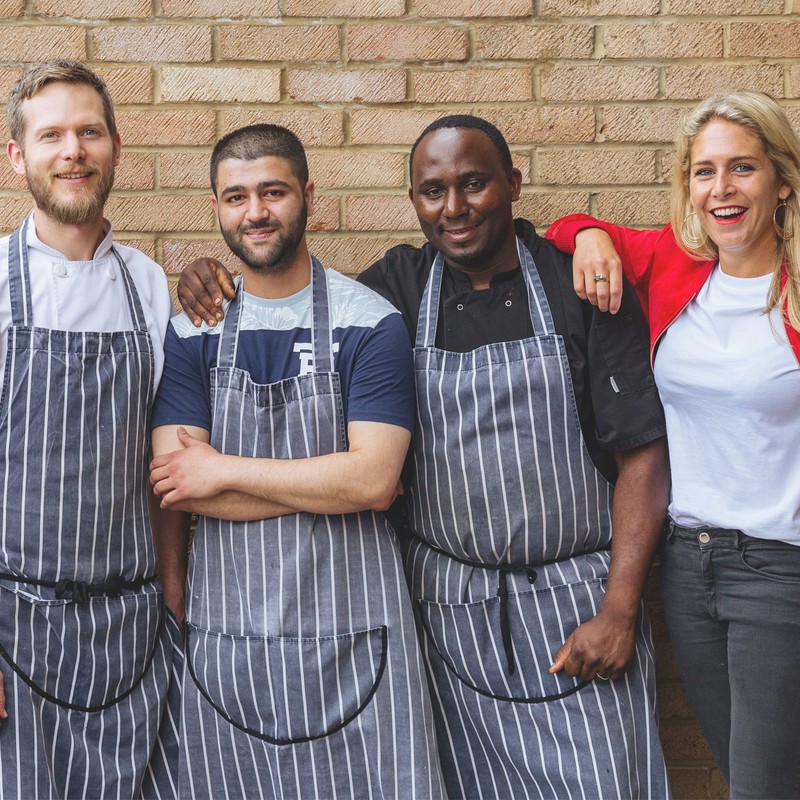The Business Giving Ex-Prisoners A Second Chance
It’s a pretty gutsy thing to build a socially driven business. What inspired you?
I have always done aspects of charity work but this was an idea which interested me because I was naughty myself, growing up. When I was expelled from school at 15, I set up my first ever “business” - selling sandwiches off my bike! Because I was given a second chance, I wanted others to have the same opportunity.
And why did you decide to start working with former offenders?
I started by becoming a mentor with one of our partner charities, Key4Life. I found it so inspiring to see them make really positive, long-term changes to people’s lives that when Social Pantry grew big enough for me to need more employees, I was determined to offer ex-offenders the chance to change their path.
For other businesses that might be inspired to do the same, how do you start employing ex-offenders?
There are two main ways we recruit ex-offenders. The first is working alongside charities and government rehabilitation programs such as Switchback, Novus and Key4Life. We’ll go into prisons and recruit people when they’re still incarcerated. This is so important because knowing there’s another option gives people motivation to learn new skills for when they’re on the outside.
We also work with some other wonderful charities and social enterprises based at prisons, such as Redemption Roasters and Bad Boys Bakery. These organisations provide training and work to inmates, and we’ll go in to work with them. We also give them employment advice and offer jobs to them on release.
How many of your workforce come from prisons?
Over the last four years we have employed approximately 30 ex-offenders, but we’re always looking for more ways to employ ex-prisoners and recruit from inside prisons.
What’s the biggest challenge in employing ex-prisoners?
One thing that people tend to underestimate is how hard it is for these guys to adjust to life on the outside – they may not have a support system, stable housing, or even be used to using public transport. Other members of our team have been known to pick up ex-offenders on their first few days working with us to show them the best route into work, the correct bus to catch and ensure they know how long it’ll take to get to work.


What's the work ethic of ex-offenders like?
I’ve actually found that my ex-offender employees are some of the most hard-working, loyal and long-serving members of the team. They are the most incredible individuals and a lot of them have experience in prison kitchens, which means they fit in well.
How do you keep them motivated?
By ensuring they are always learning and their jobs are always enjoyable. A key factor is for all employees to recognise there is growth potential, both in their roles and at the company more broadly. Finally, you have to ensure they are striking the right work life balance.
Regular catch ups or an informal coffee are good ways to avoid any major issues flaring up, but they should always enjoy their day-to-day job.
Do you think the fact that you’ve gone down this charitable route gives you an edge and sets you apart from the competition?
You need to have a bloody good product to stay in business. Social or not, people only come back for the food. But we’re proud to have worked with some really big names like Armani, Adidas and Facebook, as well as private clients and a couple of weddings. On average, we do about 30 events a week.
Socially, what are your plans for the future?
We’re always looking for ways to help our ex-offender employees gain skills whilst they’re with us. For example, starting next year, we’ll be offering them to the chance to earn qualifications whilst they’re at work. We’re also always looking for new ways to recruit from inside prisons so that they can leave knowing they have a career to look forward to. Aside from our work with ex-offenders and prisons, we also want to be more green; having zero food waste is really important to us. Within the next two years, I’d also like to cut all our single-use plastic.
Finally, are there other companies like yours? If readers want to support similar businesses, who would you recommend?
Greggs and Timpson’s are also employing ex-offenders which is ace. We consider them friends in the industry. Any other entrepreneurs looking to make a difference should get in touch with me or a charity. Switchback or Key4Life are great and will guide you through the process. If I can do it, anyone can.
Visit SocialPantry.co.uk
Visit Key4Life.org.uk
Visit Switchback.org.uk
Follow Bad Boys Bakery @BadBoysBakery
DISCLAIMER: We endeavour to always credit the correct original source of every image we use. If you think a credit may be incorrect, please contact us at info@sheerluxe.com.


